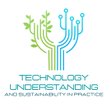Technology understanding and sustainability in practice
This project is launched at our 6 schools in order to ensure a digital transformation and at the same time develop great insight into the fight against climate change and thorough knowledge about both the UN's Global Goals and the Convention on the Rights of the Child.
We have been focusing on needs for the development this project can help us to solve through exchanging and developing new practices and methods as well as sharing and confronting ideas. Our aim is to expand our professional capacity by operating jointly on a transnational level and through our planned activities also boost the EU spirit.
On these pages, we would like to share all our experiences in hope of being able to inspire teachers across the EU to develop their competencies and at the same time help to demand this development, which will be essential in the future.
A FEW WORDS ABOUT US
Our Erasmus group consists of schools from Italy, Türkiye, Cyprus, Portugal, Iceland and Denmark
Already from the start we have known that we have different experiences with our common topics and at the same time we have different approaches to teaching. But the different ways in which objectives will be addressed in our respective countries based on the different national curricula, will overall result in better benefit/synergy than if work alone.
Find contact information for each school by pushing the buttom below.
Our transnational project meetings in Denmark, Portugal, Cyprus and Iceland
March 2024 - Digital food recipes as an eTwinning project
February 2024 - Programming with Micro:Bits
January 2024 - Working with and trying to understanding AI
December 2023 - Working with and managing VR
November 2023 - Coding games
Oktober 2023 - Obtainable goals for greater recycling, both in the individual pupil's home and throughout the school
June 2023 - Protection of physical and mental health online
May 2023 - ICT initiatives for students with special needs
April 2023 - UN Global Goals: Sustainable cities and communities
March 2023 - SELFIE tool - evaluation of our initiatives a year ago
February 2023 - Safer Internet Day
January 2023 - 3D print
December 2022 - Logo competition
November 2022 - Digital innovative proposals to save resources/energy
October 2022 - Exchange of student descriptions
September 2022 - Involvement of school management
June 2022 - Eating seasonally
May 2022 - The United Nations Convention on the Rights of the Child
April 2022 - Coding
March 2022 - Unplugged coding
February 2022 - SELFIEforTEACHERS
ABOUT OUR PROJECT
TECHNOLOGY UNDERSTANDING
To develop our priority digital transformation, we will in a period of 3 years implement different activities to meet our needs:
Several practice examples of how the new subject technology understanding can be put into practice.
Teaching courses based on progress in analyzing, comparing and critical evaluation of the credibility and reliability of sources of data, information and digital content
Cross-border teaching and learning about security, protection of devices, content, personal data and privacy in digital environments. Protection of the individual’s physical and psychological health, and the awareness of digital technologies for social well-being and
social inclusion.
Cross-border cooperation on eTwinning concerning knowledge and understanding of AI
Continuous courses on programming and innovation (Micro:Bits, Lego, robots, etc.) and cross-border collaboration to develop digital readiness
Continuous inclusion of the theory of computational thinking.
Continuous experimenting on how we make online learning more relevant, interactive and easy to use to build our professional capacity
3D printing and development across borders described and developed through eTwinning
SUSTAINABILITY
According to the fight against climate change, our project will in a period of 3 years implement different activities to meet our needs in the following main areas:
To plan and continuously refine teaching that aims to the highest possible degree of sustainability
To inspire all our students and parents in a very concrete and easily accessible way to act sustainably and thus avoid the anxiety and insecurity that characterize many pupils when it comes to to climate change
To find ways to reduce energy consumption and general waste in the case of the individual family and the school
To choose sustainable food according to local availability (how to make local, delicious food and inspire each other by exchanging recipes) and thus avoid food waste
To gain and improve recycling facilities and sustainability at schools and in local communities through innovative initiatives
To learn how to travel in an new climate neutral era through sustainable mobility choices - both in a recreational way and professionally in relation to Erasmus+ corporations
To be aware of and in various ways avoid the environmental impact of digital technologies
To innovate and calculate how to compensate for CO2 footprints both locally and at EU level until climate-neutral ways are available
CHILDREN'S RIGHTS
In our cooperation it is an objective and interest to involve both the UN's Global Goals and the Convention on the Rights of the Child in order to teach the individual child that they can each help to make a difference. In this way, we can further develop a more secure and sustainable EU, where everyone, regardless of learning problems, race or identity, can take part in the democratic process.
Our work with UN's Global Goals and the Convention on the Rights of the Child will result in outcomes that describe digital exchanges between our pupils via eTwinning regarding the object that states that parties should assure the child who is capable of forming his or her own views and the views of the child being given
weight. We will also describe how to arrange digital exchange between our pupils via eTwinning regarding the objective of what needs to be done to ensure inclusive and equitable quality education and promote lifelong learning opportunities for all children.





